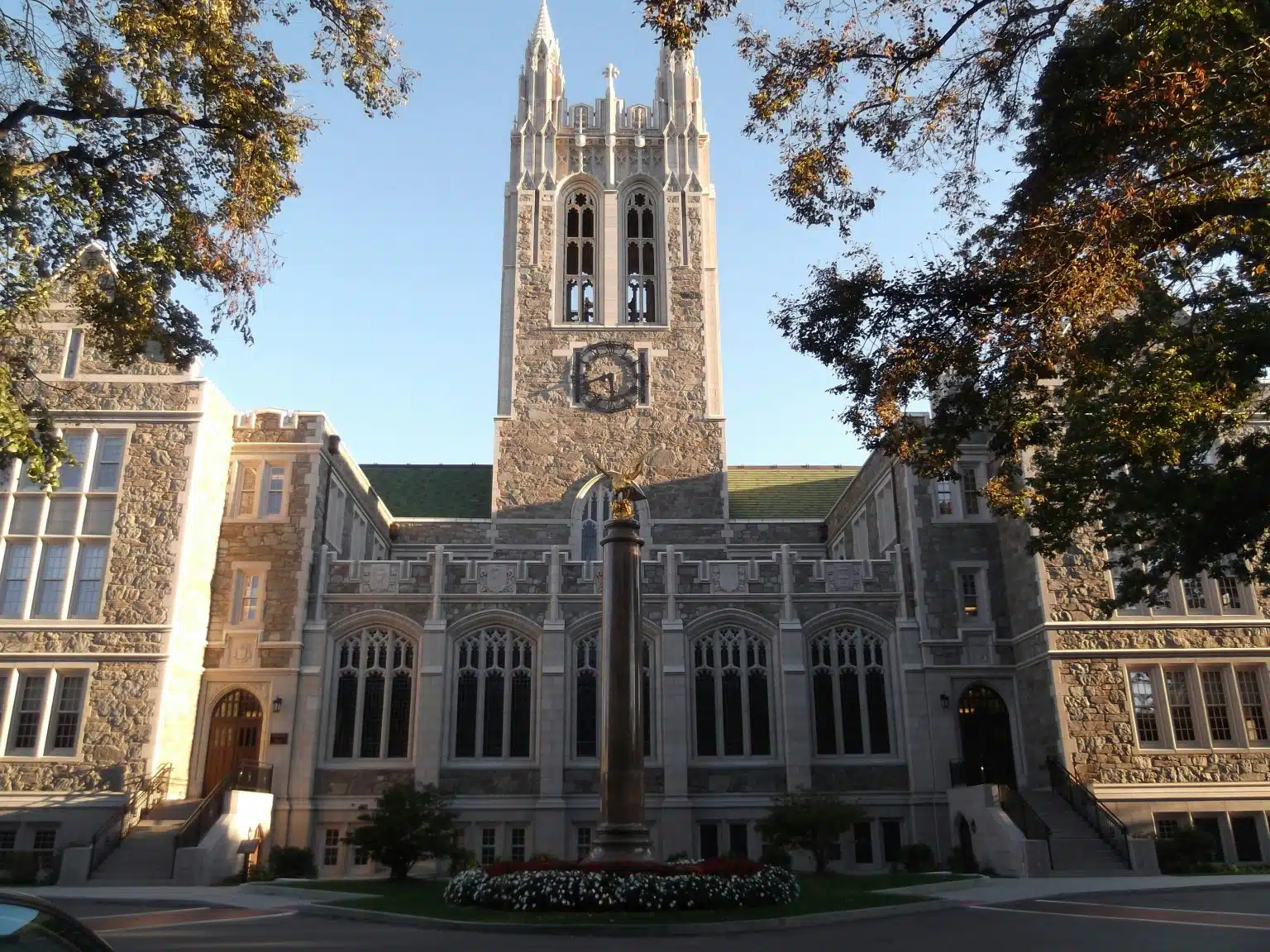During the last admissions cycle, Boston College (BC) had an acceptance rate of just 15.9%, making it a very selective school. To stand out from more than 35,000 applicants, you’ll need to make your application as strong as possible—including your supplemental essays.
Boston College requires only one supplemental essay, where you can choose from four possible prompts. But if you’re applying for the Human-Centered Engineering (HCE) major, you’ll need to answer a specific HCE prompt instead.
In this blog, we’ll break down how to write the Boston College supplemental essays and share helpful tips and actual essay examples. Plus, we’ll talk about common mistakes to avoid so you can maximize your chances of acceptance.
- Boston College Supplemental Essay Prompts
- How to Write the Boston College Supplemental Essay
- Mistakes to Avoid When Writing Boston College Supplemental Essays
- Frequently Asked Questions
- Takeaways
Boston College Supplemental Essay Prompts
If you’re applying to Boston College, you’ll need to write one 400-word supplemental essay in addition to your Common App personal statement. Most students can choose from four prompts, but if you’re applying to Human-Centered Engineering, you’re required to respond only to the fifth prompt.
Here are all the supplemental questions for the 2024-2025 application cycle:
- Each year at University Convocation, our incoming class engages in reflective dialogue with the author of a common text. What book by a living author would you recommend for your incoming class to read, and why would this be an important shared text?
- At Boston College, we draw upon the Jesuit tradition of finding worthwhile conversation partners. Some support our viewpoints while others challenge them. Who fulfills this role in your life? Please cite a specific conversation you had where this conversation partner challenged your perspective or you challenged theirs.
- In her July 2009 Ted Talk, “The Danger of a Single Story,” Chimamanda Ngozi Adichie warned viewers against assigning people a “single story” through assumptions about their nationality, appearance, or background. Discuss a time when someone defined you by a single story. What challenges did this present and how did you overcome them?
- Boston College’s founding in 1863 was in response to society’s call. That call came from an immigrant community in Boston seeking a Jesuit education to foster social mobility. Still today, the University empowers its students to use their education to address society’s greatest needs. Which of today’s local or global issues is of particular concern to you and how might you use your Boston College education to address it?
- Human-Centered Engineering (HCE) Applicants only: One goal of a Jesuit education is to prepare students to serve the Common Good. Human-Centered Engineering at Boston College integrates technical knowledge, creativity, and a humanistic perspective to address societal challenges and opportunities. What societal problems are important to you and how will you use your HCE education to solve them?
Each prompt lets the admissions team better understand you beyond your grades and test scores. As a Jesuit university, Boston College encourages students to “combine reflection and self-discovery with action,” applying their education to meet society’s needs. That means your essay should highlight not just who you are but how you’ll contribute to the BC community.
Unless you’re applying to the HCE program, you must pick between these prompts to write your supplemental essay. When choosing a prompt, think of what resonates most deeply with you and which you have plenty to share, whether about your personality, values, or background.
400 words might seem like a lot, but once you start writing, you’ll realize it’s not much when trying to show your personality. But don’t worry! In the next section, we’ll go over how to approach each prompt and craft the best response.
How to Write the Boston College Supplemental Essay
| Prompt option 1: Each year at University Convocation, our incoming class engages in reflective dialogue with the author of a common text. What book by a living author would you recommend for your incoming class to read, and why would this be an important shared text? |
| Word count: Max 400 words |
Calling all bookworms! This prompt asks you to talk about a book by a living author that had a big impact on you and is worth recommending.
You have lots of room to be creative in your response, but avoid choosing super popular novels like Harry Potter, which will likely be written about by many other applicants. However, if you really, really want to talk about a popular book or classic, write about a fresh perspective or take.
It might also be tempting to pick a book related to your major, but try thinking outside the box, especially if you’ve already covered your major in your personal statement. Ask yourself: What book has stayed with you because of who you are and what you care about? Which characters felt most relatable? How would your peers benefit from reading it?
Brainstorming ideas
Picking the right book is the key to this essay. Here are some ideas to keep in mind when choosing what to write about:
- Books that challenge perspectives. Consider books that changed how you see the world, like Between the World and Me by Ta-Nehisi Coates, which explores race and identity in America.
- Books that inspire action. Choose books that encourage readers to make a difference, such as I Am Malala by Malala Yousafzai, which highlights the importance of education and activism.
- Books that explore ethical dilemmas. A novel like Klara and the Sun by Kazuo Ishiguro, which raises questions about artificial intelligence and humanity, could trigger deep discussions.
- Books that connect to BC’s Jesuit values. The Book of Joy by the Dalai Lama and Desmond Tutu discusses finding purpose and happiness, aligning with BC’s focus on reflection and service.
- Books that reflect personal experiences. If you have a strong cultural or personal connection to a book, like Crying in H Mart by Michelle Zauner, it could help you showcase your identity and values.
There’s no “best” book for this answer, but it should be one you genuinely believe would be valuable for your classmates. Think about what kind of conversations it could inspire and why it would be meaningful to read as a group.
Essay structure tips + examples
Once you’ve nailed down your idea, here’s how to structure your essay:
- Personal connection. Open with a moment that shows how the book impacted you. For example, you could start with, “When I finished ‘A Thousand Splendid Suns,’ I just sat there, stunned. The story of Mariam and Laila was deeply moving, and it made me realize how much I’d taken my own freedoms for granted.”
- Book summary. Give a short summary without retelling the entire story. “Khaled Hosseini’s A Thousand Splendid Suns follows two Afghan women whose lives are shaped by war, oppression, and resilience. Their struggles are heartbreaking, but their strength and friendship make this a memorable story about survival and hope.”
- Why it matters to BC students. Show how the book connects to Boston College’s focus on reflection, service, and leadership. “BC values education that sparks empathy and action. This novel forces readers to confront issues like gender inequality, war, and injustice, reminding us that being aware of the world’s struggles is the first step toward making a difference.”
- Why your classmates should read it. Explain how the book would lead to meaningful discussions. “Reading this as a class would start important conversations about privilege, resilience, and how to use our education to advocate for others. Mariam and Laila’s stories may be set in Afghanistan, but their themes are universal.”
- Ending. Wrap up by reinforcing why this book is a great choice. “College is about expanding your perspective, and ‘A Thousand Splendid Suns’ does exactly that. It makes you ask: How can we use what we’ve learned to uplift those who don’t have the same opportunities?”
This prompt mentions Boston College’s First Year Academic Convocation, where students reflect on their faith and have meaningful discussions with others. But that doesn’t mean your supplemental essay has to be about a religious book! Instead, choose a book that’s important to you and center your essay on why others should read it, too.
| Prompt option 2: At Boston College, we draw upon the Jesuit tradition of finding worthwhile conversation partners. Some support our viewpoints while others challenge them. Who fulfills this role in your life? Please cite a specific conversation you had where this conversation partner challenged your perspective or you challenged theirs. |
| Word count: Max 400 words |
For this essay, focus on someone in your life who agrees with you on some things and challenges you on others. Then, explain your relationship, what you mean to each other, and how your connection has grown or changed over time.
Who do you talk to about anything? For some, this could be a parent, sibling, or other family member. For others, it may be a friend, teacher, or spiritual leader. What do you usually talk about? We recommend avoiding hot-button topics. You don’t need to solve the Middle East crisis or take a stand on abortion.
Your topic can be something as simple as trying to understand a friend’s K-Pop obsession or debating whether “white lies” are okay. There’s no need for a clear right or wrong answer, either, but your essay should show common ground or a fresh perspective.
Brainstorming ideas
Consider these ideas when brainstorming:
- Family disagreements. Conversations with parents, grandparents, or siblings often challenge your views on tradition, expectations, or generational differences. Maybe you argued with your grandfather about social media, and by the end, you both saw its impact from a new perspective.
- Friendly debates. Disagreements with friends can shape your values and perspectives on pop culture, ethics, or personal choices. Perhaps a friend called you out for pirating movies, saying it hurts creators, and it actually made you rethink your stance.
- Classroom discussions. A debate in school might have challenged your viewpoint on history, politics, or morality. For example, a discussion in history class about the American Dream made you realize that not everyone starts with the same opportunities.
- Cultural or religious perspectives. Conversations about identity, faith, or customs can open your mind to new ways of thinking. For example, a friend may have explained why they fast during Ramadan, giving you a new appreciation for discipline and spirituality.
- Lighthearted but meaningful discussions. Even fun debates can reveal deeper ideas about how you see the world. Maybe a debate over pineapples on pizza became a bigger realization about how culture shapes personal taste.
No matter what topic you choose, the key is to show personal growth. The best essays reveal how a conversation made you see the world a little differently, even if you didn’t completely change your mind.
Essay structure tips + examples
With a topic in mind, here’s how you can format your essay:
- Start with the conversation. Drop the reader into the moment to make it engaging. For example: “‘You’re being brainwashed,’ my grandfather scoffed as I scrolled through TikTok. ‘It’s just entertainment,’ I shot back, but I wasn’t sure if that was true.”
- Give context. Explain your relationship with this person and why this topic mattered. “My grandfather swears by his morning newspaper while I get my news in 15-second TikTok clips. He thinks social media is full of misinformation; I argue it gives young people a voice. This wasn’t just about TikTok but about how different generations view truth.”
- Show the back-and-forth. Highlight how both sides made strong points. “He pulled up an article on deepfake videos, proving how easy it is to spread false information. I fired back with a TikTok campaign that raised thousands for a local shelter in days. ‘See?’ I said. ‘It’s not all bad.’”
- Reveal the impact. Explain how the conversation shaped your perspective. “I started fact-checking viral news before sharing it, and my grandfather admitted that, maybe, the internet wasn’t all bad.”
- End with reflection. Connect the lesson to how you think today. “I didn’t abandon social media, and he didn’t start using TikTok, but we both walked away a little less certain we were right about everything. And that’s what real conversation is about: challenging, questioning, and being open to change.”
Whether you agreed to disagree or either of you shifted your perspective even slightly, show that you’re open-minded and willing to listen. These are the qualities the admissions team is looking for.
| Prompt option 3: In her July 2009 Ted Talk, “The Danger of a Single Story,” Chimamanda Ngozi Adichie warned viewers against assigning people a “single story” through assumptions about their nationality, appearance, or background. Discuss a time when someone defined you by a single story. What challenges did this present and how did you overcome them? |
| Word count: Max 400 words |
This prompt is similar to a “Diversity” essay, but it’s not just about race or ethnicity. If you’ve ever been judged or stereotyped for something beyond your control, you could write a strong essay to answer this question.
Maybe you were called a dumb blonde or mistaken for being LGBTQ+ because you were part of the theater club. Share your experience as a story so the admissions team can understand how this experience made you feel.
Because the prompt says “a time” and “someone,” make sure to write about a single moment and one person rather than a pattern of experiences.
Brainstorming ideas
Think about moments when you felt misunderstood or unfairly judged. This could be:
- Cultural or ethnic assumptions. Maybe a teacher assumed you didn’t need help in English class because of your last name, or people expected you to be fluent in a language you don’t actually speak.
- Gender stereotypes. Perhaps you were told you weren’t strong enough for a leadership role because of your gender, or someone dismissed your interest in STEM because “girls aren’t good at math.”
- Socioeconomic assumptions. Maybe classmates assumed you were wealthy because you went to a private school, or a coach doubted your ability to afford extracurriculars.
- Personality labels. Maybe people labeled you shy and overlooked your leadership potential, or assumed you were always confident when you struggled with self-doubt.
- Hobbies and interests. Perhaps you were judged for liking something unexpected, like a football player who loves cooking, or a gamer who also enjoys classical music.
There are many ways to approach this prompt, but the key is to show how you were defined by a single story, how it affected you, and how you challenged or grew from that experience.
Essay structure tips + examples
Whatever experience you choose, the most important part of your response is showing how you overcame it. Make this the main focus of your essay.
- Start with a compelling story. Jump right into the moment when someone defined you by a single story. For example, “During my first soccer practice, a teammate looked at my pink cleats and asked if I was only there because my parents forced me to play. I laughed it off, but deep down, I felt like I had something to prove.”
- Explain how this assumption impacted you. Show the emotional, social, or academic effect this moment had on you. “I started hesitating before calling for the ball, second-guessing whether I really belonged on the field. It felt like no one expected me to be good just because I liked makeup and dressed ‘girly’ off the field.”
- Describe how you responded. This is the heart of your essay—show what actions you took to challenge or rise above the single story. “Instead of letting their assumptions define me, I practiced harder. I stayed after drills, worked on my footwork, and pushed myself in every game. Eventually, I became a key playmaker on the team, proving that skill has nothing to do with appearance.”
- Reflect on what you learned. Colleges want to see how this experience shaped you. “I learned that people will always make snap judgments, but it’s up to me to show them who I really am. Now, I embrace being athletic and feminine, knowing that strength comes in different forms.”
- End with a takeaway. Wrap up by showing how this experience continues to influence you. “Today, I don’t let stereotypes hold me back. Whether on the field, in the classroom, or anywhere else, I know that my identity isn’t limited to one story.”
As you write, keep your summary brief so you can focus most of your words on how you felt, responded, and overcame the challenge. With only 400 words, you don’t have space to write a thesis about society’s misconceptions about people with disabilities or women who wear hijabs. Instead, focus on sharing personal moments where others defined you before you had the chance to introduce yourself.
| Prompt option 4: Boston College’s founding in 1863 was in response to society’s call. That call came from an immigrant community in Boston seeking a Jesuit education to foster social mobility. Still today, the University empowers its students to use their education to address society’s greatest needs. Which of today’s local or global issues is of particular concern to you and how might you use your Boston College education to address it? |
| Word count: Max 400 words |
Activists, this one’s for you! This prompt asks you to write about a local or global issue you’re extremely passionate about, whether climate change or another pressing topic.
Admissions wants to see how you’ll use a Boston College education to tackle the issues. Your topic can reflect a bigger social issue or something personal to your hometown or community. Maybe your town has faced environmental racism, with factory farms polluting the air and water for years.
Choose something you actually care about. It doesn’t have to change the world, but it should mean something to you. Try to avoid broad topics like world hunger and instead focus on a specific angle you can dive into.
Brainstorming ideas
To help you narrow down a topic, here are some brainstorming ideas:
- A cause dear to your heart. Think about issues that matter to you, like climate change or education inequality. Maybe you volunteer at an after-school program and have seen how some kids struggle because they don’t have the same learning opportunities.
- A personal connection. If an issue has affected you or someone close to you, it will make for a more compelling essay. Perhaps someone in your family struggled with mental health but couldn’t get the help they needed, and now you want to make mental health resources more accessible.
- A global challenge with local action. Think about how large-scale problems manifest in your community. Maybe pollution feels like a distant issue, but you’ve seen the effects of poor air quality in your city and want to push for better environmental policies.
- A unique perspective. If you have an unconventional take on an issue, lean into it. Maybe instead of just addressing homelessness, you’re interested in how financial literacy programs could help prevent it.
- How BC fits in. Your response should clearly show why Boston College is the right place to pursue this issue. If you care about media literacy and fighting misinformation, BC’s Communication program can help you understand how media shapes opinions and teach you ways to promote accurate, responsible journalism.
When choosing a topic for this prompt, think about issues that genuinely concern you and whether they impact your local community or the world at large. Your response should connect your passion with how Boston College can help you make a difference.
Essay structure tips + examples
Once you’ve chosen your topic, here’s a way to organize your response:
- Start with a personal story. Engage the reader with a real-life experience. “My younger brother had severe asthma, but we rarely went to the doctor because we couldn’t afford frequent checkups. One night, his wheezing got so bad we had to rush him to the ER—a moment that made me realize how many kids suffer from lack of healthcare access.”
- Explain the larger issue. Connect your personal experience to the bigger picture. “Millions of low-income children face preventable health issues simply because they don’t have regular medical care. Without proper treatment, conditions like asthma, diabetes, and even minor infections can turn into life-threatening emergencies.”
- Show how BC can help. Highlight specific programs, professors, or opportunities at BC that align with your passion. “At Boston College, I would major in Biology to understand the systemic barriers that prevent families from getting the care they need. I’m also eager to learn from professors like Dr. Philip Landrigan, whose research on children’s health and environmental hazards aligns with my passion for preventive care.”
- Illustrate your impact. Show how you hope to contribute, both at BC and beyond. “Through BC’s PULSE Program, I can work directly with underserved communities while taking courses like ‘Values in Social Service and Health Care’ to better understand systemic health disparities. This hands-on experience and academic study will help me develop real solutions to improve healthcare access for vulnerable populations.”
- End with a vision for the future. Bring the essay full circle with your long-term goals. “I want to become a pediatrician working in low-income communities, making sure no child has to suffer simply because they can’t afford a doctor’s visit. Boston College’s commitment to service and social justice will prepare me to realize that vision.”
This prompt is your chance to show why BC is the right place for you. Since there’s no separate “Why This College” essay, make sure to highlight the specific programs and resources that make BC the perfect fit for your goals.
| Prompt for Human-Centered Engineering (HCE) Applicants only: One goal of a Jesuit education is to prepare students to serve the Common Good. Human-Centered Engineering at Boston College integrates technical knowledge, creativity, and a humanistic perspective to address societal challenges and opportunities. What societal problems are important to you and how will you use your HCE education to solve them? |
| Word count: Max 400 words |
This prompt is just for HCE applicants only and is a lot like prompt #4. Pick a societal problem that matters to you, explain why it’s important, and show how Boston College’s engineering education will help you find a solution.
Make sure your response connects to your major and highlights real experiences from your activities list. This could be projects, research, internships, or anything else that shows your passion for solving real-world problems. Take some time to research the HCE program and BC’s resources so you can show that you’ve thought seriously about your future and how the school fits into your plans.
Brainstorming ideas
Here are some brainstorming ideas to help you choose a societal issue to write about:
- An issue that affects your community. Think about a challenge you’ve seen firsthand, like access to healthcare, transportation, or clean energy. Maybe your town struggles with unreliable public transit, making it hard for people to get to school or work.
- A problem you’ve studied or researched. Have you explored topics like renewable energy, medical technology, or environmental sustainability in school or through extracurriculars? Perhaps a science fair project on water filtration sparked your interest in improving clean water access.
- A topic connected to your interests and skills. Consider an issue that aligns with your strengths in math, science, or problem-solving. Maybe you enjoy coding and want to use technology to make education more accessible for students with disabilities.
- A broader issue that feels personal to you. Some problems may not directly impact you but still resonate deeply. If you’ve followed stories about communities affected by natural disasters, you might want to work on disaster-resistant infrastructure.
Again, your topic doesn’t have to be groundbreaking. It just needs to be something that genuinely matters to you. Focus on why this issue is important and how you see yourself making a difference.
Essay structure tips + examples
Once you’ve picked your topic, follow this structure to craft a strong response.
- Begin with something personal. Hook the reader with a real-life experience that connects to your chosen issue. “While visiting my grandparents’ rural hometown, I saw a young boy struggle to pump water from a rusty well. When the handle gave way, only cloudy, unsafe water trickled out. At that moment, I realized how scarce clean water still is, and I wanted to help change that.”
- Explain the problem and why it matters. Connect your personal experience to a broader societal problem. “Over two billion people lack safe drinking water, facing serious health risks and daily struggles. Many water filters are costly and hard to maintain, making them inaccessible for low-income communities. The real challenge is developing solutions that are both effective and affordable.”
- Show how BC’s HCE program can help you solve it. Highlight specific courses or research opportunities that align with your goals. “Boston College’s HCE program will teach me the technical skills and mindset to create real solutions. Through courses like ‘Making the Modern World’, I’ll learn to design water filters that are effective, easy to use, and sustainable for the communities that need them most.”
- Connect back to Boston College’s values. Wrap up your essay by tying your goals with BC’s Jesuit tradition of service and ethics. “Boston College’s focus on the Common Good perfectly matches my goal of making clean water more accessible. Through the HCE program, I want to turn my passion for problem-solving into real solutions that help people live healthier, safer lives.”
This supplemental essay isn’t too long or complicated, but it still takes time to get it right. Give yourself enough space to write and edit your answer, especially since the prompt requires you to do a lot of research.
Mistakes to Avoid When Writing Boston College Supplemental Essays
Avoiding common pitfalls is important to craft a strong supplemental essay.
Here’s what to watch out for:
1. Not editing and proofreading
It may sound like a ‘duh’, but many students submit essays with spelling and grammar mistakes. These errors can make your writing harder to read and leave a bad impression on the admissions team. Remember, your application reflects your writing skills and attention to detail, so always proofread your work and, if possible, have someone else, like a teacher or professional editor, review it, too.
2. Writing an autobiography
Many students try to pack too much into their essays, either telling their entire life story or, even worse, listing their achievements in chronological order. Your essay should highlight a specific moment or experience that shaped you, not read like a resume. (Admissions already have that, anyway.) With only 400 words to make an impression, focus on explaining your thoughts in your own voice rather than trying to cover everything.
3. Choosing the wrong topic
Boston College provides specific essay prompts, so choose one that resonates with you and allows you to share something meaningful. If you’re struggling to pick a topic, avoid broad, overused ones like moving to a new school, the impact of COVID-19, or a generic “hard work pays off“ story. Remember, admissions officers read thousands of essays, so you must have a unique and deeply personal perspective to stand out.
Frequently Asked Questions
1. Does Boston College have supplemental essays?
Yes, Boston College has a supplemental essay along with the personal statement on the Common App. Consider this essay as your chance to share something unique about your personality or values that don’t often come across in other parts of your application.
2. How many supplemental essays does Boston College have?
Boston College only has one supplemental essay. You’ll need to respond to one of four essay prompts, unless you’re applying to HCE, in which case you’ll only answer prompt #5.
3. How important are Boston College supplemental essays?
Super important! As a need-blind college with a stunning campus near Boston, BC gets thousands of applications each year. Your supplemental essays could be the deciding factor in whether you get accepted, especially when compared to applicants with similar GPAs.
Takeaways
- Boston College only requires one 400-word supplemental essay.
- You can choose from four different prompts, unless you’re applying for the Human-Centered Engineering (HCE) Major, in which case you’ll need to answer the fifth prompt.
- Avoid common writing mistakes, such as writing a lengthy, unfocused essay, choosing the wrong topic, and not editing or proofreading your work.
- Hiring a private admissions consultant can help refine your essay and provide tailored advice to make your application stand out.



































